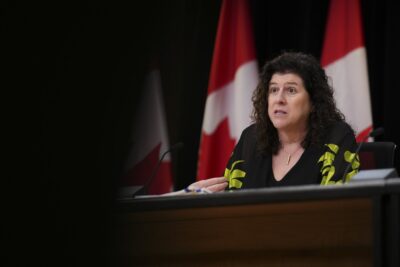CRA call centres gave too many taxpayers bad advice, auditor general says
By Canadian Press on October 21, 2025.

OTTAWA — The Canada Revenue Agency’s contact centres provided accurate responses to individuals’ questions about taxes only 17 per cent of the time between February and May 2025, the federal auditor general said in a report released Tuesday.
Auditor General Karen Hogan’s office placed calls to the CRA’s contact centres over four months this year, asking general questions.
The report said the call centres were better suited to addressing business tax or benefits questions, and provided accurate responses to those calls 54 per cent of the time. The report said the “completeness” of responses to those questions was just over 30 per cent.
They were much worse at answering questions about individual taxes; the auditor general estimates the accuracy and completeness of responses to those questions at just 17 per cent.
The report said the CRA seems more concerned with adhering to schedules for shifts and breaks than with the “accuracy and completeness of information they provided to callers.”
In a media statement, the Canadian Taxpayers Federation said the error rate of CRA call centres proves that “nobody understands the impossibly complicated rules and the government needs to simplify the tax code.”
“The Income Tax Act has become so long and complex that virtually no one can understand it,” said the federation’s federal director Franco Terrazzano. “Hiring more bureaucrats to give even more wrong answers won’t actually fix the problem.”
Just 18 per cent of incoming calls this year met the CRA service standard by being answered within 15 minutes, Hogan’s report said. Most callers waited an average of 31 minutes, she added.
“The Canada Revenue Agency has a duty to help individuals and businesses meet their tax obligations and access benefits,” Hogan said in a media statement.
“I am concerned that in spite of a new call system and other improvements, Canadians are still waiting too long to get answers to their tax questions.”
On Sept. 2, Finance Minister François-Philippe Champagne set a 100-day timeline for the CRA to address call centre delays, with a deadline of Dec. 11.
The CRA said at the time it wanted to answer at least 70 per cent of incoming calls by mid-October.
Melanie Serjak, an assistant CRA commissioner responsible for most contact centres and front-line services to taxpayers, told The Canadian Press last week that its target was surpassed by the beginning of the month.
The agency extended the term contracts for approximately 850 of its call centre agents and rehired a few hundred more.
The CRA also said it’s expanding its use of artificial intelligence as part of the 100-day plan to improve services. The agency is extending the hours its online chat service is available and increasing the number of questions its AI chatbot can answer.
Serjak said the AI chatbot being piloted is “much like ChatGPT” and can be used by Canadians to get answers to “some non-account specific questions related to personal taxes and benefits.”
Speaking to reporters Tuesday, Champagne said the government was “ahead of the curve” on tackling problems at the CRA.
“We saw that coming, we saw that we needed to improve services for Canadians,” he said. “We were already ahead of the game by asking that we improve services, that we use technology, that we allocate more people because we want efficiency and at the same time, we want great services for Canadians.”
Tax-Filer Empowerment Canada, a national association representing about a dozen of the country’s leading tax preparation and tax software firms, said in a media statement that the auditor general’s report proves that the CRA “has been struggling to pick up the phone for years, and the situation is not getting any better.”
“Today, the auditor general is confirming that the status quo is not enough to meet the basic expectations of Canadian taxpayers,” the statement read. “A government which is serious about reducing the size of the public service while improving services to Canadians should challenge our industry to do more rather than relying solely on an agency which has a hard time delivering on its core mandate.”
This report by The Canadian Press was first published Oct. 21, 2025.
Alessia Passafiume and Catherine Morrison, The Canadian Press
25-24

